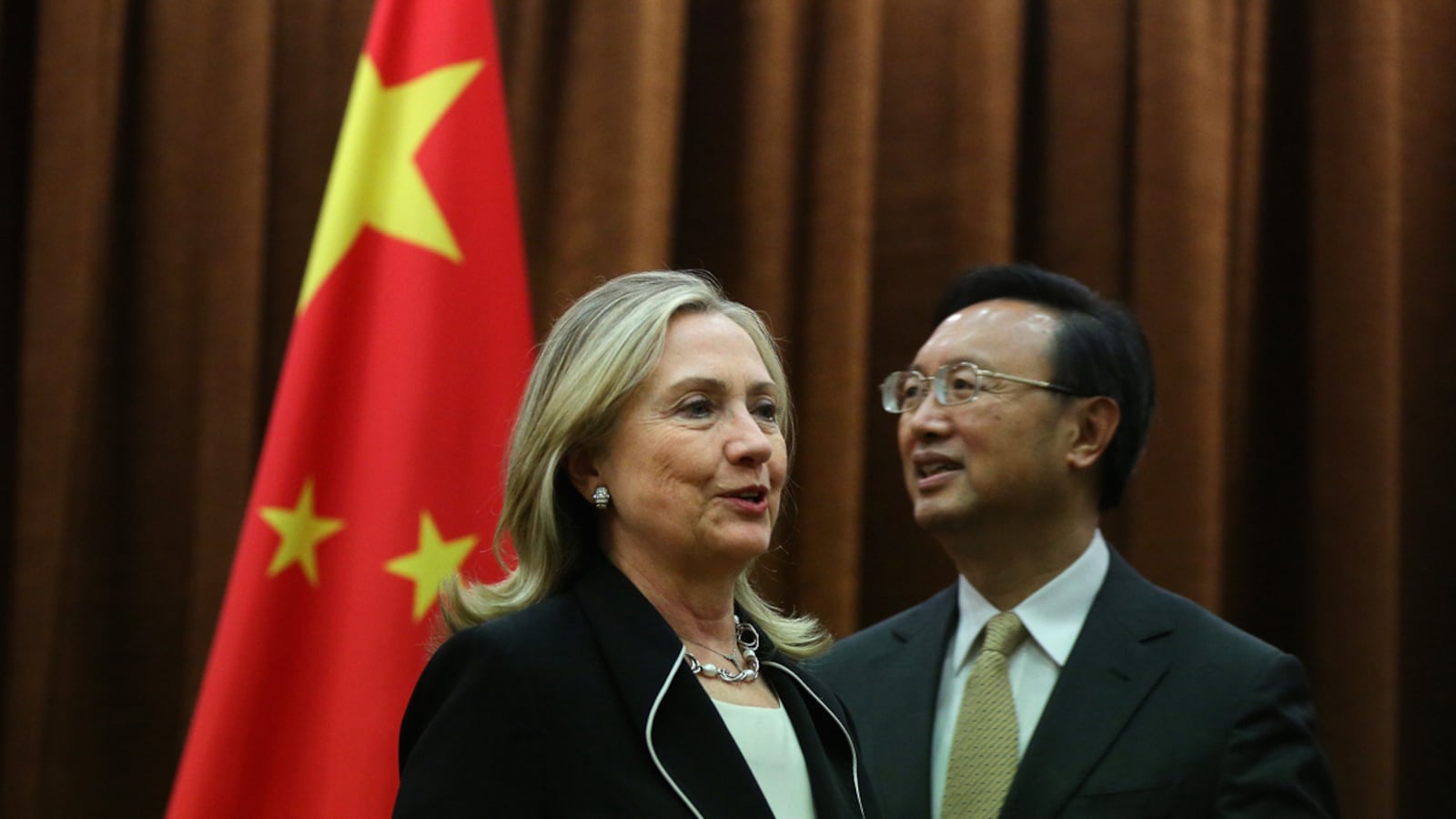Following talks with Chinese president Hu Jintao in Beijing, Secretary of State Hillary Clinton highlighted the success of ongoing diplomatic dialogue with China at a time of growing tensions over a series of geopolitical disputes ranging from disagreements over the South China Sea to Iran and Syria.
At a press conference on Wednesday with her Chinese counterpart, Foreign Minister Yang Jiechi, Clinton reiterated that the United States is eager to work with China to resolve crises that threaten global stability.
But the efforts by both officials to convey a relationship built on mutual goodwill followed talks that did little to resolve conflicts, nor did the cancellation of meetings with Hu’s apparent successor, Xi Jinping. Clinton, who is in the midst of an 11-day regional tour that may be her last as secretary of state, cast her tenure as a long-term success.
“Our two nations are trying to do something that has never been done in history, which is to write a new answer to the question of what happens when an established power and a rising power meet,” Clinton said, adding that while the U.S. and China “do not see eye to eye on everything,” cooperation prevents unhealthy competition. “When we have disagreements we work through them,” she said.
Yang echoed those remarks, calling the talks “constructive and productive.”
The genial tone of the press conference, held in the Great Hall of the People, failed to conceal the lack of substantive movement on a yawning gap on nearly every issue. That diplomatic discord is on full display in the Chinese state media, which has issued severe attacks against Clinton and the U.S. in recent days.
Typical of the propaganda barrage underway in China, the nationalist, state-run Global Times ran an editorial saying Clinton “has brought new and extremely profound mutual distrust between the mainstream societies of the two countries."

Responding to a question by a Chinese reporter about whether the U.S. “pivot” toward Asia was in fact a move to “contain” China, Clinton dismissed “critics in both countries” and said diplomatic relations are healthy.
A major diplomatic wrinkle for the two nations in recent years has been the South China Sea, which China claims in its entirety despite competing claims by its neighbors, including the Philippines and Vietnam. The sea holds billions of barrels of oil reserves, which many regional nations would like to have access to.
Seeking to rebut China’s accusations that the U.S. is interfering in its regional affairs, Clinton stressed that the United States is not taking a position on sovereignty in the South China Sea. Rather, she said, Washington is interested in ensuring respect for international law and peaceful navigation.
That argument continues to fall on deaf ears in China. Yang again refused to acknowledge the legitimacy of the United States’ call for a binding code of conduct governing the South China Sea or guidelines for resolving maritime disputes in the region that prevent the use of force. China, which is by far the most powerful economic and military force in the region, prefers bilateral negotiations with each of its neighbors, which give the country considerably more leverage than if the smaller nations were allowed to act as a unified front.
"China has sovereignty over the islands in the South China Sea and the adjacent waters,” Yang said. “There is plenty of historical and jurisprudence evidence of that."
Going beyond the South China Sea dispute, Clinton met with Chinese leaders to demand once again that China cease supporting Syrian President Bashar al-Assad as that country falls deeper into civil war. The West has repeatedly been frustrated by China and Russia in its attempts to have the United Nations adopt sanctions against the Assad regime.
Clinton urged that Assad be made to face “real consequences” for his brutality and warned that China’s support for the Syrian regime is contributing to the deterioration of regional stability, citing “dangerous clashes in Lebanon and growing tensions in Turkey and Jordan.”
But Yang refused to back down from China’s position that the Syrian regime and the rebels must resolve the conflict on their own rather than allow the world to pursue other options that might end the bloodshed.
"I think history will judge that China's position on the Syria question is a promotion of the appropriate handling of the situation, for what we have in mind is the interests of the people of Syria and the region," Yang said.
Clinton was supposed to meet with Vice President Xi on this trip, but his sudden cancellation deprived her of that opportunity. Amid the state media’s flood of criticism of Clinton that surrounded her visit, such a high-profile cancellation is likely to spur talk of a deliberate snub. But Xi reportedly also cancelled an earlier meeting with Singapore’s prime minister. Whether that quiets the chatter remains an open question.





